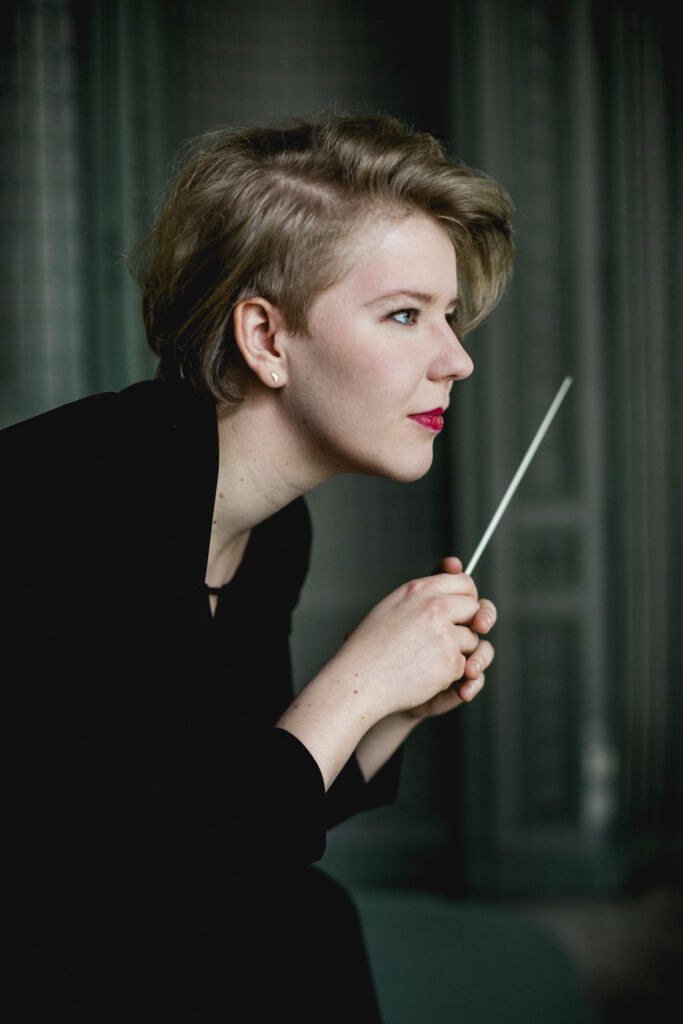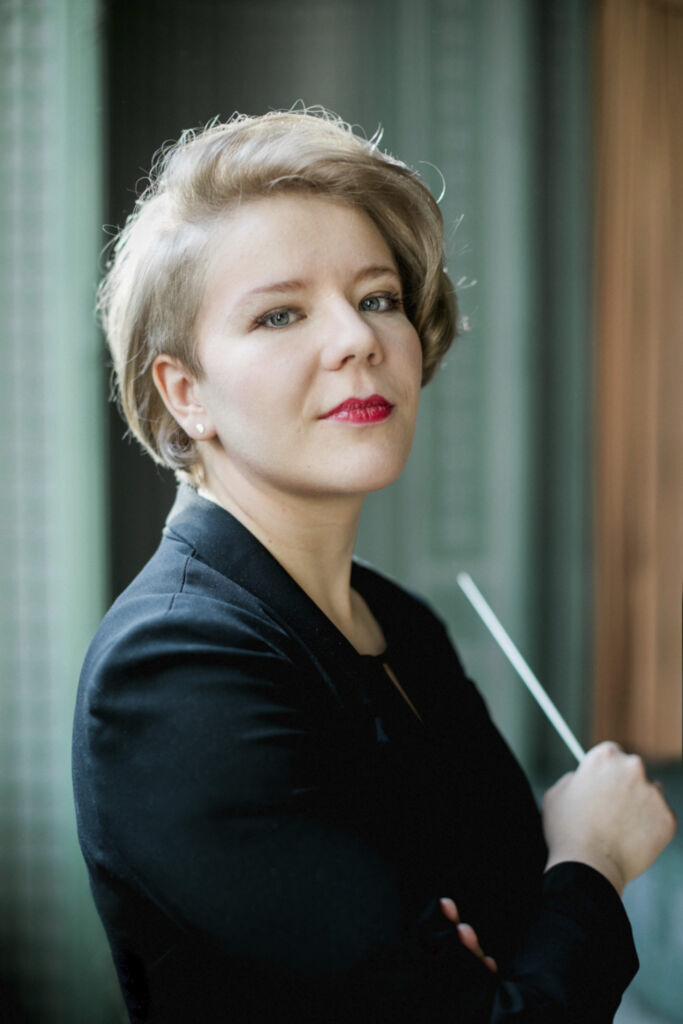Tanja Elisa Glinsner is not only a successful composer but also a conductor and mezzo-soprano. She frequently performs or conducts her own works on renowned stages in Austria and abroad. Among her compositions, many—though not all—are based on themes relating to the natural world.

Wind blowing across the treetops. Creaking and cracking branches. A watery splash. A jumble of different voices. Sirens. Those who listen closely to the orchestral work Ein Baum. Entwurzelt. Der ins Leere fällt. [A Tree. Uprooted. That Falls into Nothingness.] will discover and experience a moving tale of nature. Tanja Elisa Glinsner is the composer of this work, which she submitted to the Ink Still Wet Composer-Conductor Workshop in 2022 and premièred at the workshop’s location in Grafenegg. The Upper Austrian, born in Linz in 1995, took her inspiration for it not only from a formative childhood experience with a tree but also from the poems Brennender Baum (The Burning Tree) by Bertolt Brecht and Ebene Landschaft [Flat Landscape] by Maria Luise Weissmann. “[…] A Tree. Uprooted. That falls into nothingness” are the words with which the latter poem concludes. “In my compositions, the tree stands for notions like home and a feeling of security as well as for safety, childhood, and the place to which one is native. And with the idea of uprootedness, which you can hear in things like abruptly cut off sounds, I wanted to contrast all that with the opposite, as in: homelessness or displacement and a certain emptiness,” explains Glinsner, who studied composition at the mdw under Wolfgang Suppan, Dietmar Schermann, and Michael Jarrell. She currently studies orchestral conducting with Mark Stringer as well as vocal performance with Claudia Visca, stage performance with Christoph Ulrich Meier and Helen Malkowsky, and art song in the class of Angelika Kirchschlager.

In her work wie eine wissenschaftsburg… [like an academic castle…], a setting of fragmentary texts by Walter Pilar, it was clear to this multiple award-winning artist that she wanted to create a humorous but also nature-tinged interpretation centred around water in various forms. Nature in and of itself isn’t always present in her works as such a matter of course. Often enough, it’s much rather the case that individual aspects thereof serve to represent personal experiences and feelings: “Nature is often just the medium and not the original underlying idea.” In her compositions, this exceptional talent engages near-coincidentally with nature as a theme, returning to it again and again via indirect routes. Her works’ central origins frequently lie in mythology and also feature tie-ins with philosophical questions by way of poetic references. As an example, she mentions Scena di Medea—her interpretation of the Medea myth and Grillparzer’s drama Das goldene Vlies (The Golden Fleece), in which she deals with Medea’s betrayal by Jason. The interwoven and personal approaches that she takes here give rise to various different worlds of sound. On the other hand, the work Von gläsernen Himmelsscherben [By Glassy Shards of the Heavens]—a staged meditation on the poem Der Mensch ist tot (Man Is Dead) by Claire Goll—prominently features pieces of wood, iron, and stone being struck together. “Natural material is used in order to express something that’s actually industrial,” says Glinsner in explanation of her creative process here. This striking of such objects at the beginning of the performance introduces a post-apocalyptic scene depicting work in a workshop. Only gradually, through the sound of a clarinet, does something “natural” and familiar then become audible, with the protagonist beginning to perceive her surroundings in a different way. “I want the idea of a composition to be something that’s well founded; only once this is the case do I seek out the medium best capable of conveying precisely that in a symbolic sense. My chosen medium often ends up being something associated with nature, since I feel that such things can probably be understood by everyone.”
Just how her works are ultimately heard and perceived depends on the personal feelings of the listeners. While Ein Baum. Entwurzelt. Der ins Leere fällt engages with what is a highly personal theme for the composer, some who hear this work perceive associations with environmental themes and the climate crisis. “I would, of course, like to help the audience understand my images,” she says. But even so: “To me, composing is dealing with symbols and asking: What symbols do I have? What do I, myself, see in them? And what do I want to see on paper? I ultimately want to leave it to the audience whether they also see or sense these symbols like I do, but at the same time I always trust entirely in the energy inherent in the symbols themselves.”
If her success is any indication, audiences would indeed seem to understand: over the past several months, Glinsner’s compositions have been heard at the Vienna Musikverein as well as in Frankfurt and in Hong Kong. For the Short Operetta Festival, part of 2024’s European Capital of Culture events in the Salzkammergut region, she composed the operetta GOLDAUSTRUD’L oder ‘Die sch(t)rumpfende Stadt’, into which she integrated snippets of the Blue Danube Waltz in a humorous way. And she also continues to make frequent appearances onstage as a singer, most recently in Frankfurt for the late-October world première of her chamber opera Schweig still, mein Stein [Be Still, my Beating Stone], performed as part of an official ceremony of Akademie Musiktheater heute (AMH)—a programme of the Deutsche Bank Foundation that supports young theatre talents—in cooperation with Ensemble Modern.
Ein Baum. Entwurzelt. Der ins Leere fällt. for orchestra:

